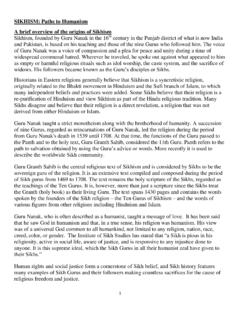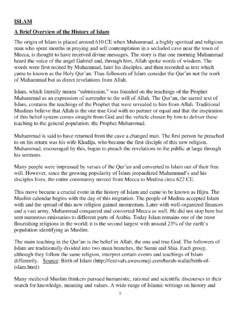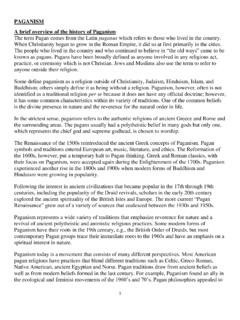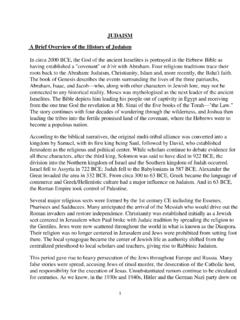Transcription of HINDUISM A Brief Overview of the Development of Hinduism
1 1 HINDUISM A Brief Overview of the Development of HINDUISM There are several important historical facts about HINDUISM that are relevant to the humanist context. Its origin can be traced back to the pre-historic era with its ancient scriptures dating back more than four thousand years, but no specific point of origin can be cited. While its roots can be seen in Iron Age India and, hence, it is recognized as the oldest living major religion it was not founded with a religious perspective. HINDUISM essentially originated as a set of rules or regulations to help people lead a disciplined life. This set of rules adhered to the fulfillment of duties, moral values, and the importance of self-realization through meditation. It is not confined to the teachings of a specific person or a single deity. In fact, it is polytheistic in the practice of worshipping innumerable gods, each corresponding to either a philosophy, a natural power, or a representation of a certain moral value or quality.
2 HINDUISM is an accumulation of diverse traditions and has no specific person to point out as its founder. It was not started as a religious system but rather as a regulated way of life which, with the passage of time, was transformed into religious concepts. Writings originally meant for the betterment of life of the common people took up the form of holy books such as the Vedas, Upanishads and Puranas which existed to enlighten practitioners. The four Vedas -- the Rig Veda, the Sama Veda, the Yajur Veda and the Atharva Veda -- are the authentic texts of HINDUISM and are comprised of hymns, incantations, rituals and the importance of practicing them in daily life. The concept of God in HINDUISM is largely empathic with natural powers such as Agni (fire),Vayu (wind) and Varuna (water). The concept of Trimurti or Three-forms (comprising of the Gods Brahma,Vishnu and Shiva) is related to the three stages of life: birth, life and death. HINDUISM , therefore, is a philosophical approach to life as much as it is a religious concept.
3 According to Klaus Klostermaier, a prominent scholar of HINDUISM , the Hindu tradition has proven to be open to new ideas and scientific thought and that numerous elements of HINDUISM overlap with and share the values of humanism. Scholars often refer to HINDUISM as a way of life. Humanism also is a way of life, the lifestyle of many people across the world. Researchers indicate that constructing a reliable timeline for HINDUISM is challenging for several reasons including the fact that HINDUISM is extremely diverse and only relatively recently was conceived as a single, distinct religion and, secondly, its written narratives span many eras of time and forms of existence. Nonetheless, researchers have drawn up extensive timelines for HINDUISM . Most sources identify the roots of HINDUISM with the Aryan migration into India around 1500 BCE and with the subsequent composition of the Rig Veda. The chronology below is commonly presented and has been simplified to include only the more relevant elements: 3,000 1500 BCE: Indus Valley Civilization 6,000 1900 BCE: Indus-Sarasvati Civilization 1500 500 BCE: Vedic Period -- beginning with the Aryan migration 500 BCE 500 CE: Epic, Puranic and Classical Ages 500 CE 1200 CE: Early and Middle Medieval Period --Theological establishment of Vedanta.
4 1200 1757 CE: Muslim Period -- Development of the theistic traditions 1757 1947 CE: British Period -- The reform movements and birth of neo- HINDUISM 1947 CE -- present: HINDUISM established as a world religion Source: 2 The term Neo- HINDUISM is generally used to describe Hindu thinkers who, among other things, have been willing to re-interpret concepts and traditional philosophies in the light of new circumstances and influences external to HINDUISM and who have been committed to organized, practical service to humanity. ( ) Recommended reading A Survey of HINDUISM by Klaus K. Klostermaier, State University of New York Press; 3rd edition, 2010. A comprehensive survey of the Hindu tradition, the book deals with the history of HINDUISM , the sacred writings, the Hindu worldview, and the specifics of the major branches of HINDUISM --Vaisnavism, Saivism, and Saktism. It also focuses on the geographical ties of HINDUISM with the land of India, the social order created by HINDUISM , and the various systems of Hindu thought.
5 The third edition includes chapters on the origins of HINDUISM as well as its history of relations with Buddhism, Christianity, and Islam. The Key Principles, Beliefs and Concepts of HINDUISM . HINDUISM is defined and described in a variety of ways, as the following items indicate: -- HINDUISM gives less importance to the image of God in one s mind than to what values one carries and how the individual evolves. The evolution of the individual mind and personality is more important in the Hindu value system than the faith or religion one adheres to. Because of the importance it gives to the values ingrained in all religions, it is along with Buddhism often referred to as the most secular religion in the world. -- HINDUISM is heterogeneous in that it consists of several schools of thought. There is variation in local practices and the worship of particular deities. However, there are central tenants that unify it as one tradition. The core of traditional HINDUISM is faith in Brahman, the underlying universal life force that encompasses and embodies existence which may be worshiped in personal forms such as Vishnu, Shiva or Shakti.
6 -- HINDUISM allows people to develop and grow at their own pace by making different spiritual paths available to them. It allows various schools of thought under its broad principles. -- HINDUISM grants absolute and complete freedom of belief and worship. -- HINDUISM is both a religion and a way of life. -- The set of rules for good living or Dharmic living that have been laid down constitute the Hindu religion. Source: Core Values of HINDUISM ( ) Within these broad principles, there are a number of specific beliefs and concepts. Dharma. According to HINDUISM , all humans are born with certain duties and obligations. Hindu scriptures teach that when a person fulfills his or her duties, all will benefit and when all people submit to their individual dharma, the society as a whole flourishes. Dharma has been described in a number of ways: right conduct, righteous living, and moral law. It connotes not only rules but also duties that arise from rules.
7 Anyone who makes dharma central to one s life strives to do the right thing according to one s duty and obligations. Karma. Most Hindus share a belief in the concept of karma, the effect of past actions on present circumstances. Traditionally, Hindus believe in reincarnation -- the cycle of life, death and rebirth -- and karma is connected to this belief. According to Hindu philosophy, if one s thoughts and deeds are kind and compassionate, the soul will reap positive results. Karma directly influences the life situation into which one is reborn. If a person creates good karma, he or she will be reborn into a pleasant situation in the next life. Moksha. Moksha means liberation or the soul s release from the cycle of death and rebirth. It occurs when the soul unites with Brahman by realizing its true nature. Several paths can lead to this, including the path of duty. Brahman. The conception of Brahman has not been replicated by any other religion and is exclusive to HINDUISM .
8 Brahman does not refer to the anthropomorphic concept of God of the Abrahamic 3 Brahman is not a He at all, but rather .. the transcendent origin of all things. ( ) Yamas. In order to achieve liberation from the cycle of birth, death and rebirth, Hindus who practice Raja Yoga (one school of Hindu philosophy) place value on a number of essential morals called yamas and niyamas. The first yama is nonviolence, a core moral value on which all other yamas are said to be built. The yamas, which refer to a person's behavior in day-to-day life, include truthfulness, honesty and compassion. Niyamas. In addition to the code of personal behaviors in the yamas, Hindu scriptures teach that following a code of practices called niyamas will improve a person's karma. The niyamas include, among other things, showing modesty and giving to others. In short, HINDUISM is a religion based on universality. It gives less importance to the image of God in your mind than to what values one carries and how the individual evolves.
9 The evolution of the individual mind and personality is more important in the Hindu value system than the faith or religion one adheres to. Because of the importance it gives to the good value systems ingrained in all religions, it is along with Buddhism the most secular and most tolerant religion in the world. -- Core Values of HINDUISM ( ) The Key Principles of Humanism There are numerous statements by individuals and organizations in the United States and elsewhere that express the principles of humanism. Several relate to the issue of a set of rules , or more accurately, a set of beliefs and values. Humanism is a non-religious ethical outlook based on an interest in human affairs at the human scale. It is not a doctrine or a set of rules; it is a starting point, its founding idea being that ethics must be based on the facts of human experience. For some, the result of thinking for themselves about ethics might be close to a conventional moral outlook; for others, the result might be less conventional.
10 Either way, one's choices must not be aimed at harming others and that one must be able to make a solid case for one's outlook if challenged by others. Source: Humanism's faith in reason represents our best hope ( ) Humanism is a label for a certain range of beliefs and values. To the extent that you do or do not share these beliefs and attitudes, so you may be more or less inclined to call yourself a humanist. Taken together, they are a set of beliefs and values which constitute a view of the world a philosophy by which many people live their lives. Source: Humanism: Beliefs and Values ( ) Humanism is a life-stance and as such it rests on a set of values, such as human dignity and the recognition of the inherent and intrinsic worth of the human personality, which allow human beings to lead a full and meaningful life. These values inspire humanists in their interpersonal relations and, more generally, in their behavior towards other people as well as in their views on a just society.








